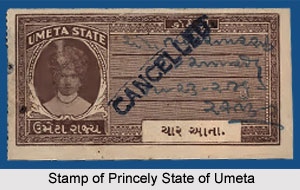 The Princely State of Umeta, also known as Umetha or Umata state, was a former non salute native state of India. The region was assigned as one of the princely states of India during the early 19th century. The princely state was under the indirect control of the British Empire in India. The taluka was spread over a total area of 24 sq miles and comprised of a total population of 6,676 in the year 1941. The Princely State of Umeta or Umata was one of the 26 states which formed up the Pandu Mehvassi. The taluka was located towards in the extreme west of the Pandu Mehvassi, on the banks the Mahi river towards the west of the city of Baroda. The region comprised of 2 groups of villages. The first group included 5 non jurisdictional villages including Umeta itself which were located in the Kaira district of British India. The other group included 10 villages in the Gujarat States Agency.
The Princely State of Umeta, also known as Umetha or Umata state, was a former non salute native state of India. The region was assigned as one of the princely states of India during the early 19th century. The princely state was under the indirect control of the British Empire in India. The taluka was spread over a total area of 24 sq miles and comprised of a total population of 6,676 in the year 1941. The Princely State of Umeta or Umata was one of the 26 states which formed up the Pandu Mehvassi. The taluka was located towards in the extreme west of the Pandu Mehvassi, on the banks the Mahi river towards the west of the city of Baroda. The region comprised of 2 groups of villages. The first group included 5 non jurisdictional villages including Umeta itself which were located in the Kaira district of British India. The other group included 10 villages in the Gujarat States Agency.
From the year 1817, the Thakor or native prince was a British zamindar in respect of Umeta and 4 other villages. The native chief was the petty monarch of a state in the other 10 villages. The state was attached to the erstwhile political agency of Rewa Kantha Agency.
History of Princely State of Umeta
The Princely State of Umeta was established by Jhanjarji, a Parihar (Padhiar) Rajput during the late 15th century. He was granted the first 8 villages from a local chief and became a Baria. Dalpat Singh, one of his descendants, expanded the territory during the 17th century, which then included the area of Umeta. The rule of male primogeniture, by which the first born or eldest child of the same parents the first born or eldest child of the same parents, to the exclusion of all others, was followed in the succession of the throne or gadi of the princely state.
Administration of Princely State of Umeta
The erstwhile princely state of Umeta or Umetha was under the administrative control of the Baroda Agency, which was a sub division of the Western India States Agency. Later the region was merged with the state of Gujarat. The Thakor of Umeta exercised limited criminal and civil jurisdictional authority. The native rulers who implemented jurisdictional powers were formally addressed as Meherban. Umeta state was ranked as a jurisdictionary princely state of the fifth class, before the class system was abolished in the year 1928. The Princely State of Umata paid annual tribute to the princely state of Baroda. According to the Attachment Scheme of 1943, the princely state of Umeta or Umata was attached to the princely state of Baroda.
Accession of Princely State of Umeta
The last Thakor of the princely state of Umeta acceded the state to the newly independent Union of India after the political withdrawal of the British Government of India from the country on 15th August 1947. After the country was divided between India and Pakistan, the native rulers of the states were given the option of acceding to either the Union of India or the Dominion of Pakistan. The native ruler of Umeta state decided to merge with the Republic of India.



















